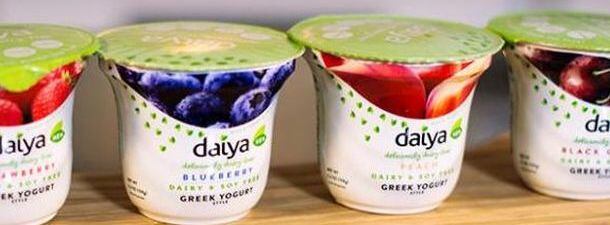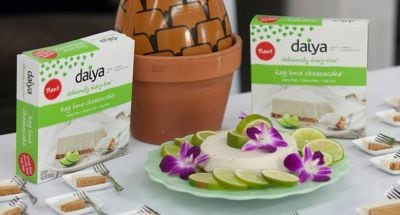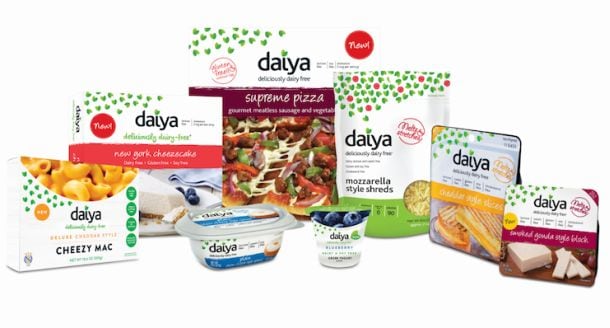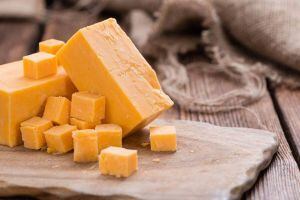“It’s impossible to put a number on it, but the potential market opportunity – when you look at all the areas we are in now – from pizzas and yogurts to cheezy mac - is huge,” Blake told FoodNavigator-USA. “Retailers have seen this explosion in meat and dairy alternatives and they want to capture this market, and capture the consumers that are buying these products.”
And investors, it appears, would agree, if VC interest in Kite Hill, Miyoko’s Kitchen, Hampton Creek, Impossible Foods, and Beyond Meat - plus the recent acquisitions of Vega, So Delicious and Gardein - is anything to go by.
We always felt that the latent size of the market was way bigger than people were claiming
But can plant-based cheese and yogurts realistically hope to capture a similar share (almost 10%) of the dairy cheese and yogurt market that plant-based ‘milks’ such as almond milk have managed to secure over the past decade?
Why not, says Daiya Foods, which first hit shelves at Whole Foods with its cheese alternatives in 2010, and now sells products pizza, ‘cheezecake’, ‘cheezy mac’, yogurts, cheese blocks, slices, shredded cheese and cream cheese-style spreads in 20,000+ stores across North America, Europe Australia and New Zealand, and is generating double-digit growth in accounts from Safeway and Kroger to Whole Foods.

While such a rapid growth trajectory partly reflects the fact that dynamic brands are transitioning from natural/specialty to mainstream grocery channels more rapidly these days, Daiya has also benefited from social media, which has enabled it to reach and engage with target consumers and spread the word without spending a ton of money on marketing, said Kroecher.
Daiya Foods first started making cheese alternatives for the foodservice market in 5lb bags, but its big break came in 2009 after it exhibited at the Natural Products Expo West trade show, and Whole Foods (which had been buying the said bags and repackaging the cheese into smaller containers for sale in its deli counters) was so impressed it offered co-founders Greg Blake and Andre Kroecher listings at its stores nationwide.
After the excitement wore off, the pair started “freaking out” when they sat down and considered the operational implications of this glorious piece of news – delivered in autumn 2009 - but worked around the clock to get their ducks in a row and start shipping products to Whole Foods in March 2010.
It’s simple. As the products get better, the entire category will grow
As for comparisons with the plant-based ‘milk’ market, the dynamics are a little different in that fluid milk is not generally consumed because people adore the taste, but because milk is part of the culture, is nutrient-rich, a staple part of many recipes, and pairs well with hot beverages, cereal, and other products, he said.
Almond milk, which has an appealing taste, has therefore managed to capture a sizeable share of the market, at least for certain usage occasions, and often sits in a refrigerator along with dairy milk in households where people just like more options, but are not necessarily lactose intolerant, vegan, or allergic to milk protein.

Cheese, by contrast, is a “comfort food”, added Kroecher, with a texture and profile much tougher to mimic, but if you can come up with a good plant-based product (Daiya’s strapline is ‘deliciously dairy-free’), why wouldn’t people buy it?
“It’s simple. As the products get better, the entire category will grow, and they are improving all the time.”
“We always felt that the latent size of the market was way bigger than people were claiming, and just saw tremendous potential,” said Blake, who said conversations in this market first revolved around food allergy and intolerance, but have rapidly expanded to encompass a broader set of health, wellness and sustainability trends.
Meanwhile, retailers such as Safeway that have stocked Daiya products in the dairy case rather than next to tofu, have seen the apparent gamble pay off, said Blake.
“It's a risk, because vegan consumers have been trained to look for these products in a certain place, and you also have to have higher turns to justify your place in the dairy set, but it paid off, because we had the turns to maintain our position and we have exposure to a broader cross section of consumers.”

We feel that the intrinsic value of the company won’t be realized if we sell now
Not surprisingly, perhaps, venture capital firms and larger strategic (food industry) buyers also started paying attention once it became clear that Daiya was going places.
“We’re constantly bombarded by private equity and strategics [who want to buy the company],” added Blake.
“And as we have shareholders, it’s our fiduciary duty to assess these offers, but as we look at our new products, and what our R&D team is capable of, it’s clear that the intrinsic value of the company won’t be realized if we did anything right now, so we’re staying the course.”
Kroecher and Blake first started selling Daiya cheese alternatives in 2009 using a combination of high-quality oils from expeller-pressed safflower oil to coconut oil; tapioca starch (an unusual choice for the time); pea protein isolate (also an unusual choice at the time, but they wanted to avoid soy); yeast; gums; and natural flavors.
You couldn’t floss your teeth with our mozzarella but it’s pretty stretchy
While some new entrants to the market producing cultured nut-type products are getting a lot of PR by talking about how vegan cheese was terrible until they came along (an icky combination of oils, starch, gums and flavors as opposed to a simpler, more ‘natural’ recipe based around nuts), Blake says there is room in the market for multiple players, while Kroecher notes that everyone is occupying slightly different spaces in the market.

Kite Hill, for example, has focused on producing softer cheeses, while Daiya began by trying to replicate the taste, texture and melting profile of “comforting” cheeses such as cheddar and mozzarella that you’d use in a grilled cheese sandwich or on a pizza (which isn’t to say its cheeses don’t pair exceptionally well with wine and crackers), he observes.
“We wanted it to be so good that we could fool people into thinking it was the real thing. You couldn’t floss your teeth with our mozzarella but it’s pretty stretchy.”
Turns on yogurts are way ahead of our forecasts
While Daiya is best-known for its cheese alternatives, it has also expanded into several new categories in the past couple of years that are generating explosive growth.
The pizzas are “flying off the shelves”, while turns on the yogurts – which first hit stores in late August – “are way ahead of our forecasts”, said Blake, who says growth is being generated by strong velocity as well as steady distribution gains.
Demand from international markets is also strong, although there is so much white space in the North American market that the company has not yet pursued many of the potential opportunities, said Kroecher. “Honestly they are pursuing us.”
